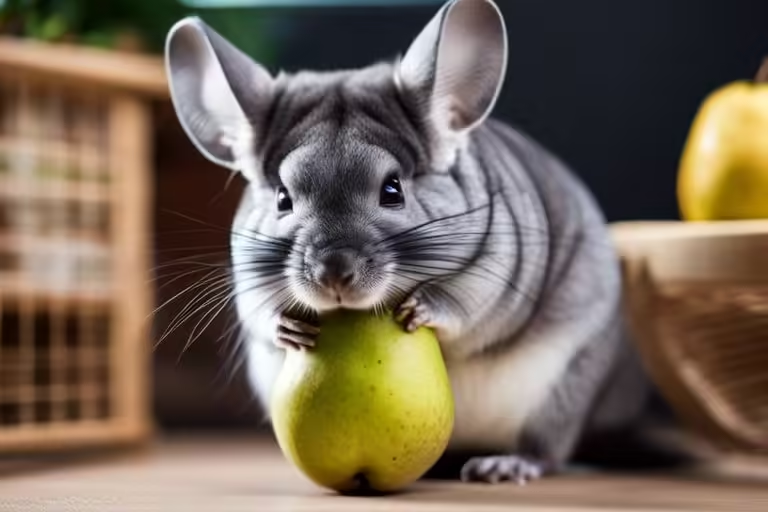Yes, chinchillas can eat pears, but only in moderation and with proper preparation. Pears can be a healthy treat due to their fiber and vitamins, but their high sugar content and the presence of cyanide in seeds require careful handling. Below, we’ll guide you through safely feeding pears to your chinchilla and highlight alternative treat options.
Key Takeaways
- Pears are safe in small amounts: Offer a small piece (no larger than a thumbnail) no more than once a week.
- Remove seeds and stems: Seeds contain cyanide, which is toxic to chinchillas. Always remove them before feeding.
- Monitor for digestive issues: Chinchillas have sensitive digestive systems, so observe your pet after feeding pears.

Chinchilla Dietary Basics
What Should Chinchillas Eat?
A healthy chinchilla diet primarily consists of:
- High-quality hay: Such as timothy hay, which supports digestion and dental health.
- Chinchilla pellets: Specially formulated to provide essential vitamins and minerals.
- Fresh water: Clean water is essential for hydration.
Treats like fruits and vegetables should only be offered occasionally and in small amounts to avoid digestive upset.
Importance of a Balanced Diet
A balanced diet is crucial to:
- Prevent obesity and digestive issues.
- Support healthy teeth through fibrous foods.
- Provide essential nutrients for overall health.
Pears as a Treat
Benefits of Pears for Chinchillas
Pears can be a nutritious treat when offered sparingly:
- Fiber: Promotes healthy digestion and prevents constipation.
- Vitamins C and K: Support immune and bone health.
- Antioxidants: Protect cells from damage and improve overall vitality.
Risks of Feeding Pears
While pears offer benefits, they also come with risks:
- High sugar content: Excessive sugar can lead to obesity and dental problems.
- Choking hazards: Pear slices can pose a risk if not cut into small, manageable pieces.
- Cyanide in seeds: Pear seeds contain amygdalin, which converts to cyanide and is toxic to chinchillas.
How to Feed Pears Safely
Step 1: Preparation
- Wash thoroughly: Remove pesticides or chemicals by rinsing under running water.
- Remove seeds and core: Seeds and stems must be discarded to prevent cyanide poisoning.
- Slice into small pieces: Cut the pear into bite-sized chunks to prevent choking.
Step 2: Portion Control
- Offer no more than one small piece (thumbnail-sized) at a time.
- Limit pear treats to once a week to avoid overloading your chinchilla with sugar.
Step 3: Monitor Reactions
Watch your chinchilla after introducing pears for signs of digestive upset, such as:
- Diarrhea
- Bloating
- Lethargy
If you notice any adverse reactions, discontinue pears and consult a veterinarian.
Alternatives to Pears
If you’re looking for other safe treat options, consider these alternatives:
| Food | Benefits | Frequency |
|---|---|---|
| Apple slices | Rich in fiber and low sugar in small portions | Once a week |
| Dandelion greens | High in fiber, supports digestion | Twice a week |
| Kale | Provides vitamins A and C | Twice a week |
| Dried herbs | Like parsley or chamomile; aids digestion | Twice a week |
Avoid fruits and vegetables that are high in sugar, water, or oxalates, such as bananas, spinach, or broccoli.
FAQ
Q: Are pears safe for chinchillas to eat?
A: Yes, but only as an occasional treat. Ensure seeds and stems are removed, and portions are kept small to avoid health issues.
Q: How often can I feed pears to my chinchilla?
A: Pears should be offered no more than once a week in small, bite-sized portions.
Q: Can chinchillas eat dried pears?
A: No, dried pears are highly concentrated in sugar and are not safe for chinchillas. Stick to fresh, small pieces of pear.
Q: What happens if my chinchilla eats pear seeds?
A: Pear seeds contain cyanide, which is toxic to chinchillas. If your chinchilla accidentally consumes seeds, monitor for signs of poisoning (e.g., lethargy or difficulty breathing) and contact a veterinarian immediately.
Q: What other fruits can chinchillas eat?
A: Safe fruits include apples (seedless), blueberries, and small pieces of strawberries, all offered sparingly.
Final Words
Pears can be a delightful treat for chinchillas when fed correctly, but precautions are essential. Always remove seeds, cut pears into small pieces, and offer them sparingly to avoid health risks. By prioritizing a balanced diet of hay, pellets, and safe treats, you’ll ensure your chinchilla stays happy and healthy.
